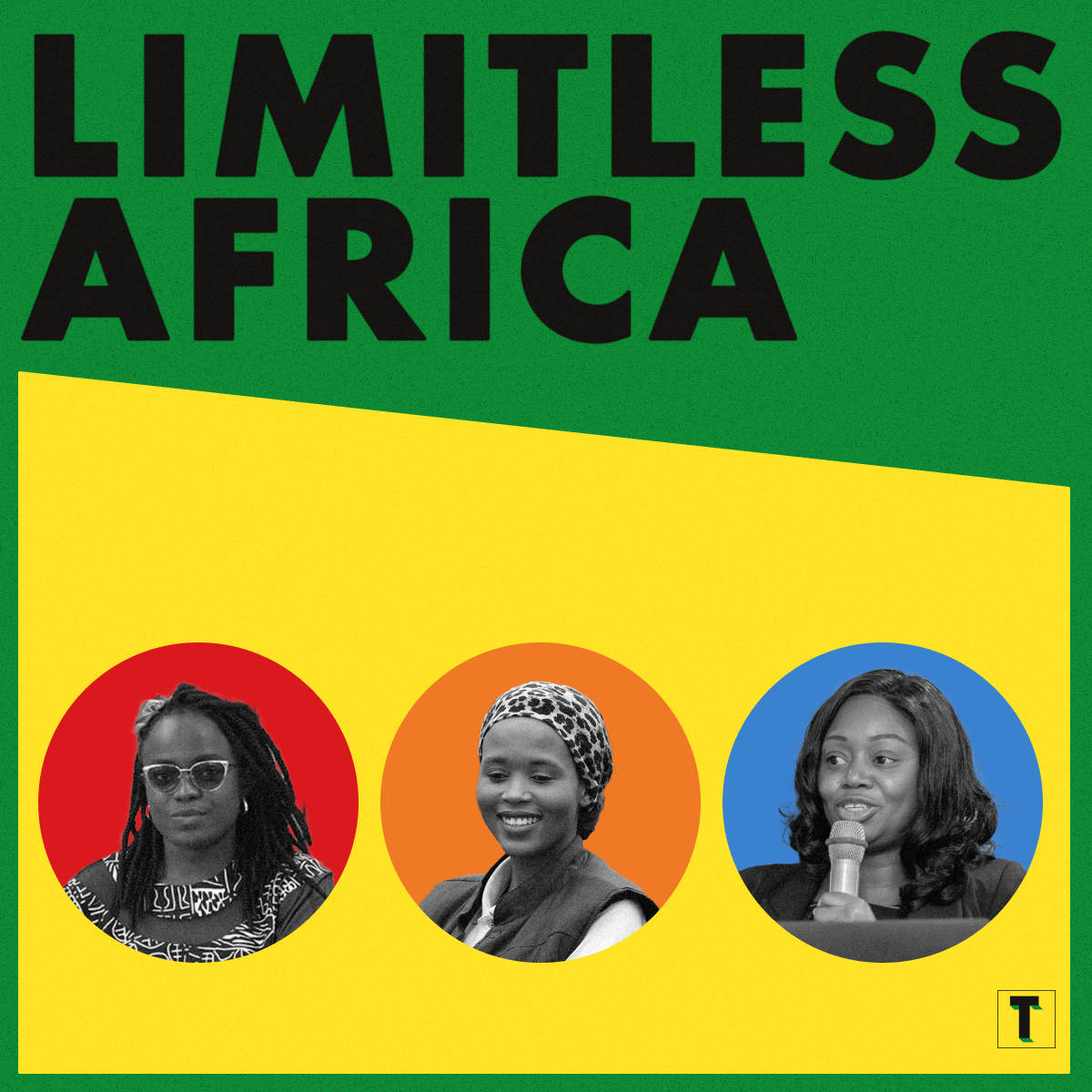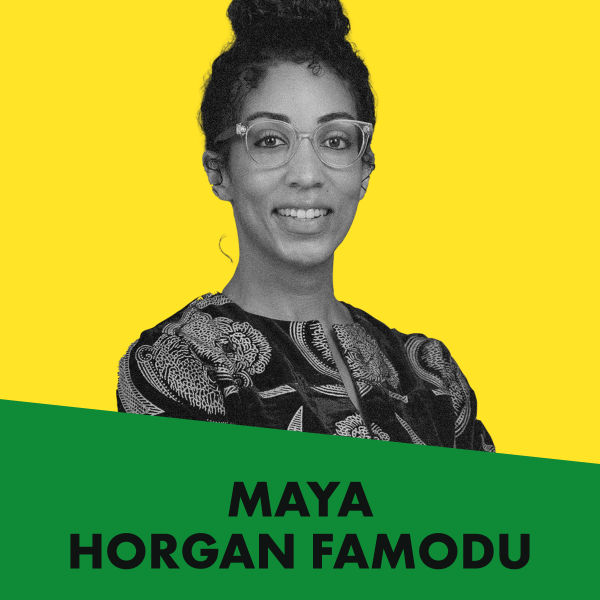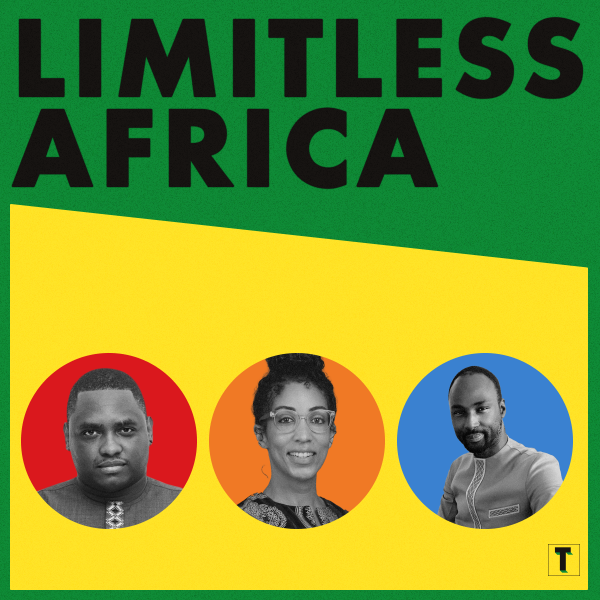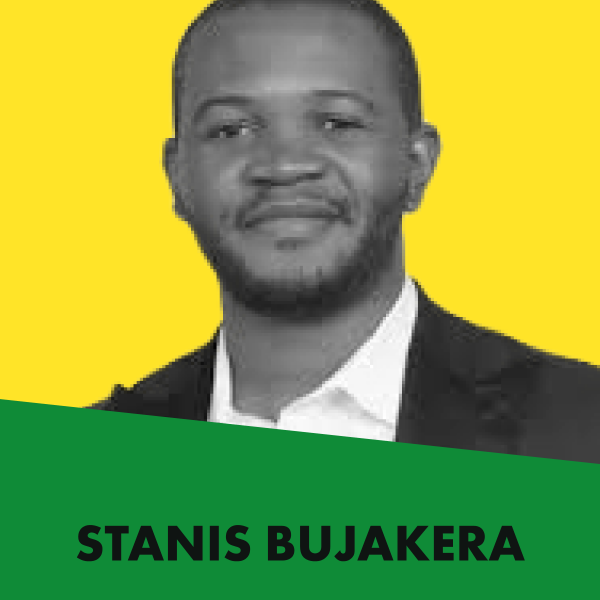How can young farming entrepreneurs fight climate change?
With guests Angela Odero, Gislaine Matiedje Nkenmayi, Gugulethu Mahlangu

Episode notes
The young farming entrepreneurs rising to the challenge
Transcript
Agriculture employs more than two thirds of those working in Africa. But farming is hard as farmers are impacted by extreme weather conditions.
In this episode we talk to some young farming entrepreneurs who are rising to the challenge.
Gislaine Matiedje Nkenmayi is the CEO of Mumita, an award-winning start-up helping small-scale farmers grow more in Cameroon.
...Agriculture employs more than two thirds of those working in Africa. But farming is hard as farmers are impacted by extreme weather conditions.
In this episode we talk to some young farming entrepreneurs who are rising to the challenge.
Gislaine Matiedje Nkenmayi is the CEO of Mumita, an award-winning start-up helping small-scale farmers grow more in Cameroon.
Gugulethu Mahlangu is a young aquaponics farmer in South Africa. She is the founder of the smart farm, House Harvest in Gauteng province.
Angela Odero is the CEO and co-founder of Rio Fish Limited. She is on a mission to promote sustainable fish farming among women and to end the sex-for-fish trade in Kenya.
TRANSCRIPT
How can young farmers fight climate change?
In this episode we’re talking farming and climate change.
“During my descent in the field, I discovered that farmers on their own, have developed their little techniques to be able to adapt to the changing climate.”
“In today’s age, farming can be flexible, you can have a greenhouse, you can go on holiday and your plants will be fine.”
“It was for me like magic, because these people were producing tonnes and tonnes and tonnes of fish in a very small space.”
Claude:
Agriculture employs more than two thirds of those working in Africa. It typically accounts for a third of an African country’s economic output. But this is still insufficient. The United Nations estimates that by 2050 2.3 billion more people will need to be fed. And this will all have to be done as temperatures around the world increase and farmers are impacted by extreme weather conditions.
In this episode we talk to some young farming entrepreneurs who are rising to the challenge.
Gislaine Matiedje Nkenmayi is the CEO of Mumita. This award-winning start-up helps small-scale farmers grow more in Cameroon. Here’s our conversation.
Gislaine:
I’m one of the co-founders of Mumita Holdings.
We centre around the African indigenous vegetable. It’s not a cash crop. It’s grown by small farmers, and, more often that not, there’s no processing in it, there’s almost no money in it. So we decided to focus on that to bring out the money in it.
We work with smallholder farmers to help them in processing and commercialise their crops.
Claude:
And so what have been some of the hurdles so far for you?
Gislaine:
We have a mentality that processed vegetables or dried vegetables are not very healthy. And that’s what the community has as a mindset. So we’ll have to re-educate the consumers on vegetable consumption.
Claude:
Well specifically on this topic of educating, what are some of the cultural stereotypes that you have encountered as you have attempted to better educate these African consumers that you are servicing?
That’s a very good question and I’m going to laugh about it because people will tell you that they can have their vegetables at the back of their house. That happens in rural communities. They will tell you: no no why should I go for vegetables in the supermarket when I can just go behind my house and cut some vegetables.
But now when you get to the urban communities, the vegetables are not even available. So you find the roadblock of the traditional attachment to the vegetables being cut in the farm – the everyday setting of a woman getting up, going to the famer, cutting her vegetables, coming to cook – to the modern woman who has to go to work so she needs pre prepared vegetables. Those are the people who easily understand our products.
But when we have to re-educate the farmers or the women or the consumers in rural societies they will tell you: I can easily have fresh vegetables, why should I go for processed vegetables, why should I have dried vegetables, why should I have frozen vegetables? Those are some of the problems we’ve had.
Claude:
Now how are you thinking of profits and entrepreneurship in this fight against climate change? Many people who have tackled this problem in Africa have just dealt with it from an aid perspective.
Gislaine:
What do we define as climate change? Climate change is just a change in the normal or the climatic pattern of the environment, be it the rain, the temperature, the relative humidity. And here in Africa, and in Sub-Saharan Africa especially, agriculture is so dependent on rainfall. We’ve had changes in the rainfall pattern, increased rates in some cases, we’ve had drought, we’ve had heavy rain. And this has caused a loss in total productivity of farmers and that has been very difficult.
I see entrepreneurship in fighting climate as a very essential tool because let’s stop seeing climate change or climate adaptation as always aid, coming from other people.
And funnily enough, during my descent in the field, I discovered that farmers on their own, have developed their little techniques to be able to adapt to the changing climate.
Take for example, the case of those who grow vegetables, they take mosquito nets and put around their farms and cover with mosquito nets. That to them is like a small greenhouse. It prevents the excess rain it prevents excess sun. It prevents attacks from outside. To them, that is climate adaptive solutions.
You go back to the research lab and you see how you can make it smarter. At the end of the day, it doesn’t make sense when we develop solutions in offices, in research labs and we go impose it on farmers. The moment we turn our backs, they don’t use it. But when you work with farmers in the farm, you understand their realities, you see their solutions, you just make it smarter.
Training these farmers is the first step in fighting climate change. We train them. We help them make their technology smarter and they have the solar-powered irrigation system which actually helped them to produce even when the seasons are changing. They don’t feel the change that much, they keep producing. And we keep buying and I mean, everyone wins at the end of the day. They have more money and the business grows.
Claude:
Gugulethu Mahlangu is a young aquaponics farmer in South Africa. She is the founder of the smart farm, House Harvest in Gauteng province. She feeds her local community with fresh greens and trains local people in sustainable farming. Here’s our conversation.
You’re saying that house harvest is the home of smart farming excellence. What is smart farming Actually?
Gugulethu:
You know when you google smart farming you will see a whole lot of you know cool technological gadgets like precision agriculture, drones, sensors, you know self driving tractors, rope, robotics, and all of those things that are used to optimise agricultural production. But when I say smart farming, I’m essentially saying that we are encompassing technology. We are being smarter about it. We are working smarter, not necessarily harder. In today’s age, agriculture can be flexible, you can have a greenhouse that has a system which works for you. You can go on holiday and come back, your plants are still fine. You can plant in your backyard, you know, land is such a touchy subject in my country in South Africa. So if you don’t have the land that does not mean that you can’t be a farmer. So it’s just this smart thinking of how we can maximise and still produce and still provide healthy fresh foods for people in the era that we’re in.
Claude:
And now I really want to hear a little bit about your farming operation house harvest and what it looks like as a business. Tell us about that trajectory.
Gugulethu:
So my trajectory is, essentially it started in 2018. I’m unemployed, I am at home I am trying to figure out what it is that I need to dedicate my time to that’s going to fulfil me. That’s going to make me happy. And I’ve discovered agriculture. I am now volunteering because I know nothing about agriculture besides you know the picturesque images on Pinterest.
But you know, I actually don’t know the business. Because I was still very young, you know, and I made a lot of rookie mistakes as with any first generational farmer doing a business but I learned a lot. I decided that you know what? I’m accumulating a lot of debts. Let me go and learn about aquaponics and get paid.
So I did that I worked at an aquaponics facility and it was absolutely amazing. I fell in love with technology and how we can utilise it for good and I decided that okay, well you know house harvest is going to change. House harvest is going to now look at ways to ensure food reaches everybody. With smart farming, you can bring farming to the heart of the people, you can bring farming to the urban cities where we all come from most of us. So I was really inspired and I kind of changed my business model and currently house harvest is a startup back in my mining town in Witbank.
We employ three people and we provide fresh leafy greens with tilapia fish. We supply restaurants, we supply air bnbs and the community as well and we’ve also added an element of training as well because it is a new way of farming. People are very curious, people are also looking for new skills and that is where House Harvest I think comes in.
Claude:
Angela Odero is the CEO and co-founder of Rio Fish Limited. She is on a mission to promote sustainable fish farming among women and to end the sex-for-fish trade in Kenya. It’s a fascinating conversation. Our journalist Dimpho Lekgeu spoke to her.
Dimpho:
Fish farming isn’t a very popular practice in Kenya. Take us through how you got into fish farming and how the market in the country has been receiving it so far.
Angela:
One thing I must say is that I’ve just always loved farming and farming. And that love of farming is what actually led me to aquaculture. Living in Uganda some years back. I knew that they had plenty of fish and I got exposed to aquaculture while I lived in Uganda. And it was such a big thing in Uganda. It was new at the time. And it was for me like magic because these people were producing tonnes and tonnes and tonnes of fish in a very small space and it was a controlled environment.
Dimpho:
Fish farming is still a male dominated industry. And I think that’s what we can say about farming as a whole right? Despite women being prominent farmers in Africa, they’re not always represented. Could you share some insights into your involvement in this particular fishing project and why it’s so significant, especially being led by a woman
Angela:
Rio fish underscores the importance of actively involving women. And this is not just at certain parts of the process. It’s right from the decision making to the implementation, because I believe that they are the backbone of agricultural activities in Africa. So by enhancing women’s meaningful participation, we at Rio fish aim to harness the full potential of the fishing sector while advancing women’s rights and economic empowerment.
Dimpho:
Climate change impacts are being increasingly felt across the continent. Could you discuss how these affect your work as a farmer and why it’s so important to promote sustainability?
Angela:
One of the things we’ve seen in extreme temperatures it’s either too cold, too long, seasonal changes, and then drought which inevitably come with water shortage or floods. we are growing fish, fish grows in water, so when there is no water, this will disrupt our production cycles, it will decrease our fish yields and also threatened livelihoods. because the less fish there is, then there is less fish to sell. There’s less fish for us to eat.
Dimpho:
What has it been like engaging communities in this new method of doing things? Have they received this education around a new and more sustainable way of doing this kind of business?
Angela:
The community has had mixed reactions. Of course, there’ll be those people who you know, jump onto it and they’re like, yes, let’s do this. but there’s also you know, the other school of thought, which seems like you know, you’re just coming up with things that don’t really exist and just making our lives difficult, less expensive for nothing. So it’s mixed reactions. But what I do know is that when, especially in rural communities when you get a believer who buys into what you’re saying, and they take it up and the benefit is seen, they automatically become ambassadors for you because people are more inclined to listen to what they’ve seen other than what they’re being told.
Dimpho:
Now Angela I want us to shift to a different element of your business which also still has a gender lens to it. Could you elaborate on the term sex for fish?
Angela:
Sex for fish refers to a socio economic issue prevalent in my community, which is a fishing community where vulnerable women are forced to exchange sexual favours for access to fish, from fishermen. It’s exploitative and it perpetuates gender based violence. Now, traditionally, gender roles are very clear. Culture puts free supply in the hands of men and processing and selling in the hands of women. But now comes about climate change. Population growth, poor fishing methods, especially illegal unregulated, undocumented fishing. This together results in scarcity.
Then you find that predator fishermen demand sexual favours from these women, when they seek fish supply. They still have to pay for the fish in cash. So you pay for the fish in cash and in kind.
Claude:
Africa has the natural ingredients needed to feed the world. And we also have something else that’s limitless: young talent like Ghislaine, Gugulethu and Angela. I was inspired by how they are using tech to increase yields and protect us against a changing climate.
Listen next
"It wasn't just an overnight thing. Seeds were planted."
With guests: Maya Horgan Famodu
LISTEN NOW 55 min
How did I make my first million?
With guests: Maya Horgan Famodu, Moulaye Taboure, Moutagna Keita
LISTEN NOW 15 min








